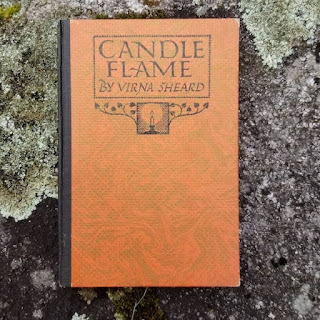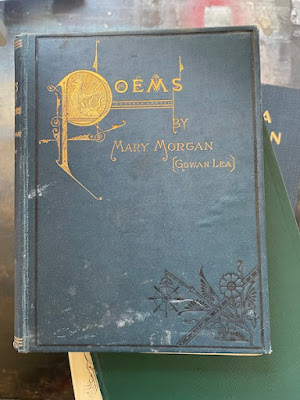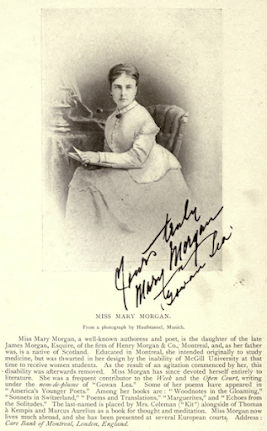Now that National Poetry Month is over, a poem for May by Virna Sheard, pride of Cobourg, Ontario, from Candle Flame (Toronto: McClelland & Stewart, 1926).
It follows verse in which she rightly praises postmen.
ALL ON A MAY MORNING
I saw a lovely lady walk along a leafy lane,
When primroses were blowing and the cuckoo sang again;
She wore a ruffled gown of pink, a hat of rosy hues,
And twinkling silver buckles on her little high-heeled shoes;
Most daintily she carried a tall tasselled cane,
While a small beribboned poodle came following in her train.
Then said I to the morning sun: "O do not let her pass!
A more bewitching, beauteous maid ne'er owned a looking-glass!
And if she turns in any gate, and goes I know not where,
It's probable I'll never see another maid as fair!
Without the faintest knowledge of her charming name, alas!
I sallied forth to meet her across the young green grass.
My hand upon my fluttering heart, I bowed extremely low,
And said: "A thousand pardons, but my way I do not know,
For since I chanced to see you from yon blossoming orchard tree,
The West is East, the South is North,—and all the same to me!
And I have not any notion which way the four winds blow,
Or on what highroad, up or down, t'would be the best to go!
"Of your kindness pray direct me to the left—or to the right;—
(You really should—because 'tis you have put my wits to flight,)
And I'd be quite madly joyful, and grateful this sweet day
If it should hap, by any luck, that your way was my way.
There surely never was a morn more gay and golden-bright,
And I have not a thing to do, but walk about till night."
Alack! That shining lady in that green primrosy lane,
Turned first to whitest marble—and then turned back again!
Her cheeks flamed red with fury—and her eyes flamed black with rage,
And she looked at me as might a queen at a good-for-nothing page!
She tossed her head, and firmly, set down the tasselled cane,
"I do not know you Sir!" she said,—and walked on with disdain.
"Beauty altogether perfect, cannot possibly be rude,"
Said I, and went the other way—but in a chastened mood;
Nor did I start a-whistling—as on such a day one should—
Till I reached the village common where a little goose-girl stood,
Egad! The prettiest goose-girl that I have ever viewed!
(Her flock was one grey gosling, by a frantic dog pursued.)
But tears were falling from her eyes, her eyes of blue-bell blue;
So I said: "Come! Come! Now what's amiss? Why all of this ado?"
And she cried: "O Sir! My darling geese! Of them I am bereft!
Of all the lovely twenty-five, there's only this one left!
What shall I do! What shall I do! Whatever shall I do!
The huntsmen came a-riding by—and all my geese just flew!"
I could not bear to see a little maiden so forlorn,
(I noticed that her curls were just the color of ripe corn;)
"Why go along with me!" said I, "tame geese will not fly far,
And you and I together will discover where they are!"
So hand in hand we hunted geese that mellow May-day morn,
And I found that little goose-girl was a rose without a thorn.
Related posts:












